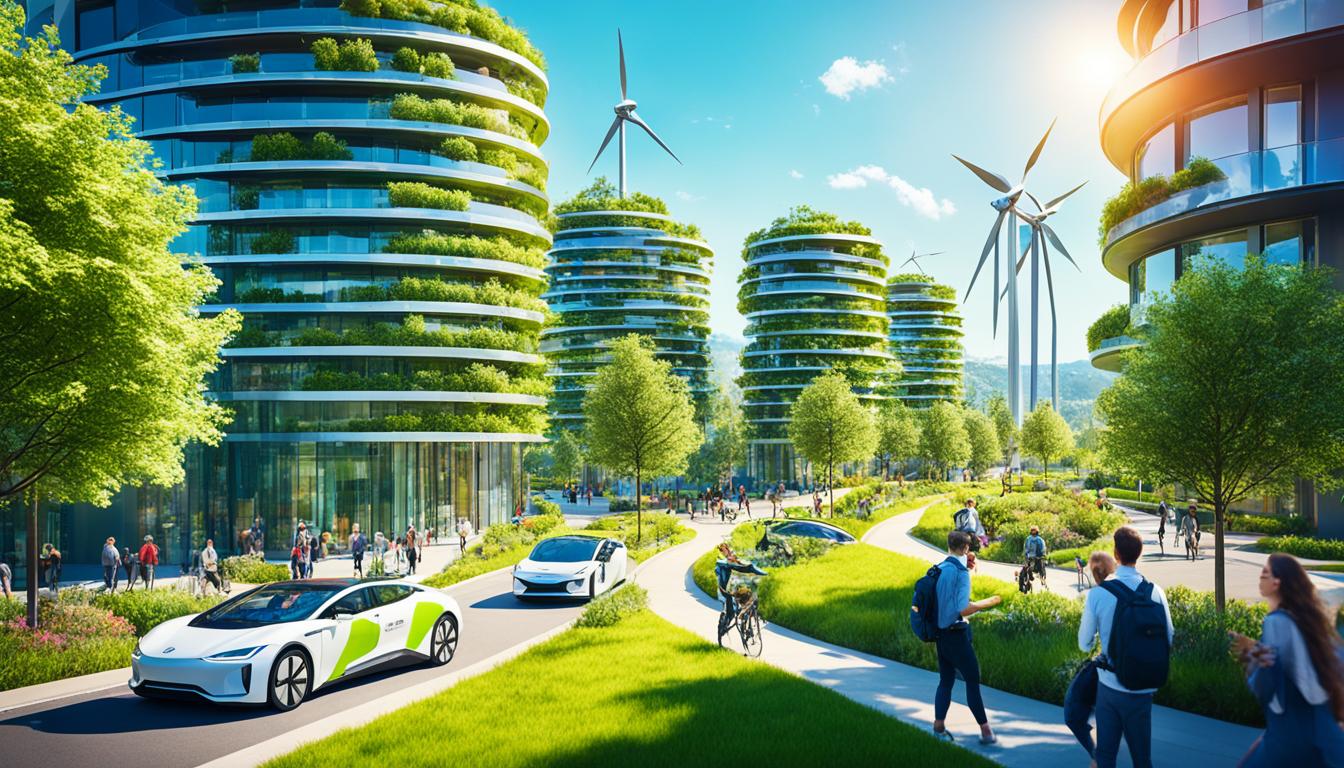
Artificial intelligence (AI) is changing industries and I’m excited about its role in sustainability. AI can create eco-friendly solutions for our planet’s big problems. It helps us use less, save energy, and protect the environment in different fields.
Key Takeaways:
- AI offers sustainable solutions for reducing energy consumption and optimizing resource use.
- Addressing the environmental impact of AI is crucial in ensuring responsible deployment.
- AI technology has the potential to identify and respond to environmental threats.
- Efforts are being made to reduce AI’s carbon footprint and minimize electronic waste.
- AI is revolutionizing sustainable real estate development, enabling smarter and greener buildings.
The Importance of Sustainable Artificial Intelligence
Our world is facing urgent environmental challenges. It’s vital to discuss AI’s sustainability issues and promote responsible use. The growing popularity of AI requires us to examine its impact on the environment. By adopting sustainable AI, we can lower energy use and fight against environmental threats.

Sustainable AI offers a chance to lessen technology’s environmental impact, leading to a greener future. If we focus on sustainability in AI systems, we can create large-scale positive changes. Let’s look into the challenges and opportunities for a sustainable AI ecosystem.
Potential Challenges
AI brings challenges for sustainability, especially in energy use. Data centers and devices that power AI need a lot of energy. This energy use leads to more carbon emissions and a larger carbon footprint. We need to find energy-efficient solutions and sustainable infrastructure.
Promising Opportunities
Yet, sustainable AI can help save the environment and use resources better. AI can lead to advances in renewable energy, waste management, and conservation. It lets us make smart models that use resources well, fight illegal activities like deforestation, and help make sustainable decisions.
“Sustainable AI offers a plethora of opportunities for environmental conservation and resource optimization.”
So, it’s key to think about AI’s sustainability problems to build a better future. By tackling these issues and using the opportunities, we can develop AI that benefits our planet. Sustainable AI is essential for a greener and more efficient world.
The Environmental Impact of AI
AI technology has made big strides in many fields. Yet, it’s important to look at the environmental costs. The tech behind AI, like data centers, uses a lot of power and resources. This leads to high energy use and lots of greenhouse gases.
Training just one deep-learning model can create as much CO2 as five cars do in their whole lifetimes. This adds to climate change and makes our environmental problems worse. The quick growth of AI also means more electronic waste, which is bad for the planet and our health.
“AI’s carbon footprint, energy consumption, and e-waste generation are critical sustainability issues that demand immediate attention.”
But, we’re trying to lessen AI’s environmental impact. Shifting to renewable energy for AI is one big step. Using clean energy cuts down the carbon footprint of AI tech.
Also, creating algorithms that use less energy is crucial. By making AI models more efficient, we save on resources and energy. This reduces AI’s overall power use.
Handling e-waste properly is another key action. We need good disposal and recycling programs. This can lower the environmental and health risks from AI gadgets.

As AI keeps growing, people making and using it must focus on being eco-friendly. By improving energy use, reducing waste, and using renewable energy, we can make AI’s impact on the planet smaller. Let’s aim for a sustainable future with AI.
The Environmental Impact of AI – At a Glance
| Environmental Impact | Solutions |
|---|---|
| AI’s carbon footprint | Shift towards renewable energy sources |
| High energy consumption | Develop energy-efficient algorithms |
| E-waste generation | Implement proper disposal and recycling programs |
AI in Sustainable Real Estate Development
Artificial intelligence (AI) is changing the game in real estate for the better. It’s making buildings greener and more efficient using data and innovation. AI helps use renewable energy better, makes waste systems smarter, and improves farming practices.
AI is crucial for renewable energy in real estate. It uses data and machine learning to find the best energy sources for buildings. This can include solar power, wind energy, and biomass. AI-powered systems make buildings more energy-efficient and less dependent on fossil fuels.
AI also improves how we handle waste in real estate. It can make trash collection smarter and recycling better. This not only saves money but also lessens environmental harm. AI supports ideas that make our economy more circular and sustainable.
In farming, AI is doing wonders too. It uses analytics and predictive models to help farmers use resources wisely and boost crop yields. These AI tools look at weather, soil, and plant health. This means farmers can use less water and fertilizer but grow more food.
Overcoming Challenges and Building a Greener Future
Despite AI’s huge potential, it’s not without its challenges. The biggest one is how expensive it is to start using AI. Yet, as AI gets better, it’ll also get cheaper and more common in real estate.
As AI technology advances and becomes more cost-effective, its integration into real estate development will accelerate, driving sustainability and environmental stewardship.
We also have to be careful with how AI uses data. Protecting personal information is key. So, security is a big deal when using AI in real estate.
In summary, AI is remaking real estate to be more sustainable and better for the planet. With AI’s help, buildings can be smarter, farming more efficient, and our impact on the environment much smaller. Even with its challenges, AI’s role in sustainable real estate is only going to grow.
Conclusion
Using AI for sustainable development is key for environmental and social goals. AI can change how we manage resources and help save our planet. The good it can do is clear.
AI can make using resources better, cut down waste, and help keep our environment safe. As AI gets better, so will its role in making the Earth greener. AI-driven projects can find new ways to solve tough problems for a greener tomorrow.
By using AI in smart ways, we can make the world better for the next generation. AI’s power to understand big data can change how we use resources. It can make buildings use less energy and improve how we handle waste.
AI can also make farming more earth-friendly. This helps lower harmful effects on the planet. The journey with AI in sustainable development is just starting. By choosing AI, we take a big step towards a cleaner, safer world.
FAQ
What is sustainable AI?
Why is the environmental impact of AI important?
How does AI contribute to greenhouse gas emissions?
What are the challenges of AI in sustainable real estate development?
How can AI contribute to resource management and environmental conservation?
Source Links
- https://www.thedigitalspeaker.com/greener-future-importance-sustainable-ai/
- https://www.linkedin.com/pulse/role-ai-sustainable-development-green-initiatives-scalebuildai
- https://medium.com/@ronaldforlee/building-a-greener-future-how-ai-is-reshaping-sustainable-real-estate-2f0c065ea36c






